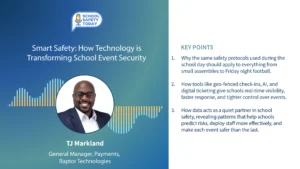Which Learning Strategies Should Stay (and Which Should Go)
In her career as an educator and administrator in DC Public Schools, Kerri Larkin worked through a variety of challenges that affected that community. In her new role, she intends to take those experiences to a wider population of students. In this episode of EdTech Today, Kerri itemizes the lessons learned during the past two school years and divines some best-case scenarios.
Lexia Learning, a Cambium Learning Group company, last month announced the appointment of Kerri A. Larkin to the position of Senior Education Advisor, Education Partnerships, effective immediately. Larkin will serve as a thought partner and advisor for school districts across the country as they design and scale specialized academic programs based on student strength and need. She will also serve as an advisor for Lexia team members.
“The addition of such a strong special education leader to our team is part of Lexia’s ongoing commitment to support the needs of school districts striving to help every student to read, write and speak confidently and proficiently,” said Lexia President Nick Gaehde. “Kerri has demonstrated a clear vision for individual and team development, program execution, strategic planning and student-centered outcomes. Her insights will be invaluable to our company and our customers.”
Larkin comes to Lexia from the District of Columbia Public Schools (DCPS) where she served as Senior Deputy Chief of Specialized Instruction for five years. During her tenure, she led the implementation, facilitation and monitoring of special education services for students from age 3 through 22. As a leader in a large urban district, Larkin and her team leveraged DCPS and national data to illuminate the urgency of institutionalized racism within the special education system in order to dramatically decrease its impact on children with IEPs and their families.
As a result of Larkin’s innovations regarding district staff’s strategic collaboration, professional development and investment in evidence-based practice, students with disabilities made double-digit gains in reading and math on the NAEP assessments. In addition, those students also showed regular annual growth in proficiency on both Partnership for the Assessment of College & Career Readiness (PARCC) evaluations and the Multi-State Alternate Assessment (MSAA).
Previously, Larkin served as the Director of Academic Programs for DCPS’ Office of Special Education from 2011 to 2016. Under her, District of Columbia Comprehensive Assessment System (DC CAS) exam scores increased by 10 points in a single academic year. Between 2011 and 2015, students in fourth grade made the third largest gains in the nation. Students in eighth grade made the fourth largest gains.
Before that, Larkin served as a DCPS master educator, a project director for the Literacy Cooperative Partnership at George Washington University, and a teacher at Anacostia High School in Washington, DC.
Larkin said, “Every single student, every single day, has the ability to read, write and speak with confidence. I am thrilled to join a team that measures success in student access to evidence-based instruction, a team that is committed to deep, sustainable partnerships with teachers, schools and systems.”
Listen to Previous Episodes of EdTech Today!
Follow us on social media for the latest updates in B2B!
Twitter – @MarketScale
Facebook – facebook.com/marketscale
LinkedIn – linkedin.com/company/marketscale








